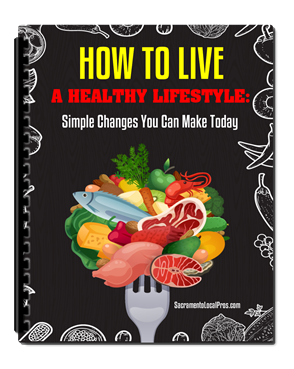Heart disease remains the leading cause of death globally, affecting millions of people each year.
The good news?
Many of the risk factors for heart disease are within your control. Simple lifestyle changes can dramatically reduce your chances of developing cardiovascular problems and help you live a longer, healthier life.
Your heart works tirelessly, beating approximately 100,000 times per day to pump blood throughout your body.
Taking care of this vital organ doesn't require drastic measures—small, consistent changes in your daily routine can make a significant difference.
We will walk you through ten ways to protect your heart and improve your overall health.
1)) Exercise Regularly For Heart Health
Physical activity is one of the most powerful tools for preventing heart disease.
Regular exercise strengthens your heart muscle, improves blood circulation, and helps control weight, blood pressure, and cholesterol levels.
How Much Exercise Do You Need?
The American Heart Association recommends at least 150 minutes of moderate-intensity exercise per week.
This breaks down to just 30 minutes, five days a week. You don't need to become a marathon runner—simple activities like brisk walking, swimming, or cycling can provide substantial benefits.
Making Exercise a Habit
Start small if you're new to exercise. Even 10-minute walks after meals can improve heart health.
Gradually increase your activity level as your fitness improves. Find activities you enjoy, whether it's dancing, gardening, or playing with your pets.
The best exercise is the one you'll stick with long-term.
2)) Eat A Heart-Healthy Diet
What you eat directly impacts your heart health. A diet rich in fruits, vegetables, whole grains, and lean proteins can significantly reduce your risk of heart disease.
Focus on These Foods
Fill your plate with colorful vegetables and fruits, which provide essential vitamins, minerals, and antioxidants.
Choose whole grains over refined options, and include healthy fats from sources like avocados, nuts, and olive oil.
Fatty fish like salmon and mackerel contain omega-3 fatty acids that support heart health.
Limit Harmful Foods
Reduce your intake of processed foods, which are often high in sodium, unhealthy fats, and added sugars.
Cut back on red meat and choose lean proteins like chicken, fish, beans, and tofu instead. Limit sugary drinks and alcohol consumption.
3)) Maintain A Healthy Weight
Carrying extra weight, especially around your midsection, increases your risk of heart disease.
Excess weight can lead to high blood pressure, diabetes, and high cholesterol—all risk factors for cardiovascular problems.
Sustainable Weight Management
Focus on gradual, sustainable weight loss rather than quick fixes. Combine a balanced diet with regular physical activity.
Even losing 5-10% of your body weight can significantly improve your heart health.
Consider working with a healthcare provider or registered dietitian for personalized guidance.
4)) Quit Smoking And Avoid Secondhand Smoke
Smoking is one of the most significant risk factors for heart disease. The chemicals in tobacco smoke damage blood vessels, reduce oxygen in your blood, and increase your risk of blood clots.
Benefits of Quitting
Your heart health begins improving almost immediately after you quit smoking. Within 20 minutes, your heart rate and blood pressure drop.
Within a year, your risk of heart disease is cut in half. After 15 years, your risk approaches that of someone who never smoked.
Getting Help
Quitting smoking is challenging, but resources are available. Talk to your doctor about smoking cessation programs, medications, or nicotine replacement therapy.
Many people require multiple attempts before successfully quitting, so don't get discouraged.
5)) Manage Stress Effectively
Chronic stress can contribute to heart disease by raising blood pressure and encouraging unhealthy coping behaviors like overeating or smoking.
Learning to manage stress is crucial for heart health.
Stress-Reduction Techniques
Practice relaxation techniques like deep breathing, meditation, or yoga. Regular physical activity is also an excellent stress reliever.
Maintain social connections and don't hesitate to seek professional help if stress becomes overwhelming.
Work-Life Balance
Set boundaries between work and personal time. Take regular breaks throughout the day, and make time for activities you enjoy.
Quality sleep is also essential for stress management and heart health.
6)) Control Blood Pressure
High blood pressure, often called the "silent killer," damages arteries and forces your heart to work harder.
Many people with high blood pressure don't experience symptoms, making regular monitoring important.
Monitoring Your Blood Pressure
Have your blood pressure checked regularly. Normal blood pressure is less than 120/80 mmHg.
If your numbers are consistently higher, work with your healthcare provider to develop a treatment plan.
Natural Ways to Lower Blood Pressure
Reduce sodium intake to less than 2,300 mg per day. Increase potassium-rich foods like bananas, spinach, and beans.
Maintain a healthy weight and exercise regularly. Limit alcohol consumption and manage stress effectively.
Consider incorporating a high-quality blood pressure supplement into your routine to support healthy pressure levels and promote overall cardiovascular wellness.
7)) Manage Cholesterol Levels
High cholesterol can lead to plaque buildup in your arteries, increasing your risk of heart attack and stroke.
Understanding and managing your cholesterol numbers is essential for heart health.
Understanding Cholesterol Numbers
Total cholesterol should be less than 200 mg/dL. LDL (bad) cholesterol should be less than 100 mg/dL, while HDL (good) cholesterol should be 40 mg/dL or higher for men and 50 mg/dL or higher for women.
Improving Cholesterol Naturally
Increase fiber intake through oats, beans, and fruits. Choose healthy fats over saturated and trans fats.
Regular exercise can raise HDL cholesterol levels. If lifestyle changes aren't enough, your doctor may recommend medication.
8)) Get Quality Sleep
Poor sleep quality and insufficient sleep duration are linked to increased risk of heart disease.
During sleep, your body repairs tissues and regulates hormones that affect heart health.
Sleep Recommendations
Adults should aim for 7-9 hours of quality sleep per night. Maintain a consistent sleep schedule, even on weekends.
Create a relaxing bedtime routine and ensure your bedroom is cool, dark, and quiet.
Addressing Sleep Problems
If you snore loudly or feel tired despite adequate sleep, you may have sleep apnea, which increases heart disease risk.
Talk to your doctor about sleep studies or treatment options if you suspect sleep disorders.
9)) Limit Alcohol Consumption
While moderate alcohol consumption may have some heart benefits, excessive drinking can lead to high blood pressure, heart failure, and stroke. The key is moderation.
What Is Moderate Drinking?
For adults, moderate drinking means up to one drink per day for women and up to two drinks per day for men.
One drink equals 12 ounces of beer, 5 ounces of wine, or 1.5 ounces of spirits.
Alcohol Alternatives
If you don't drink alcohol, don't start for heart health benefits. The potential benefits can be achieved through other lifestyle changes without the risks associated with alcohol consumption.
10)) Stay Hydrated And Consider Heart-Healthy Supplements
Proper hydration supports cardiovascular function and helps maintain healthy blood pressure.
Some supplements may also support heart health when used appropriately.
Hydration Guidelines
Drink water throughout the day, aiming for about 8 glasses daily. Your needs may be higher if you exercise regularly or live in a hot climate. Water is the best choice for hydration.
Supplements to Consider
Omega-3 fatty acids, magnesium, and CoQ10 may support heart health. However, always consult with your healthcare provider before starting any supplements, as they can interact with medications or may not be appropriate for everyone.
Conclusion
Protecting your heart doesn't require perfection—it requires consistency. Start by choosing one or two strategies from this list and gradually incorporate others as these become habits.
Small changes compound over time to create significant improvements in your cardiovascular health.
Heart disease prevention is a lifelong journey. Regular check-ups with your healthcare provider are essential for monitoring your heart health and adjusting your prevention strategies as needed.
Your doctor can help you assess your risk factors and develop a personalized plan for maintaining heart health.
The power to reduce your risk of heart disease is in your hands. By making these lifestyle changes and maintaining them over time, you're investing in a longer, healthier life.
Your heart and your future self will thank you for the effort you put in today.
Download Our Free E-book!








